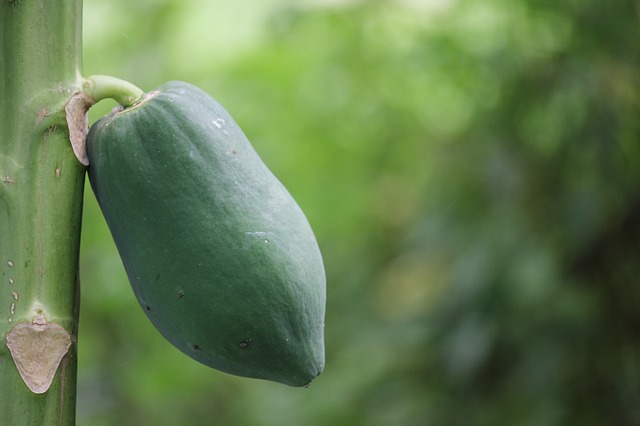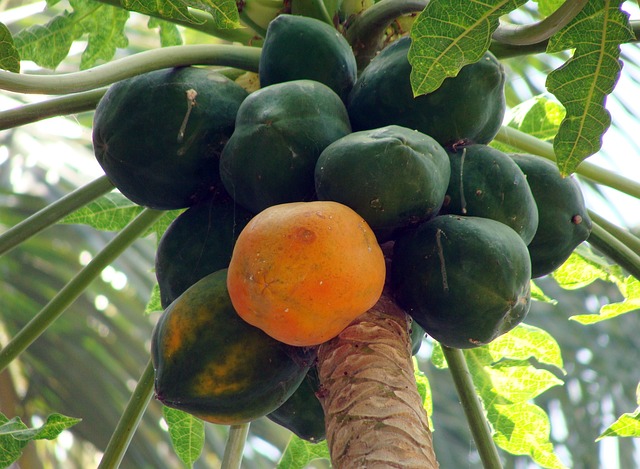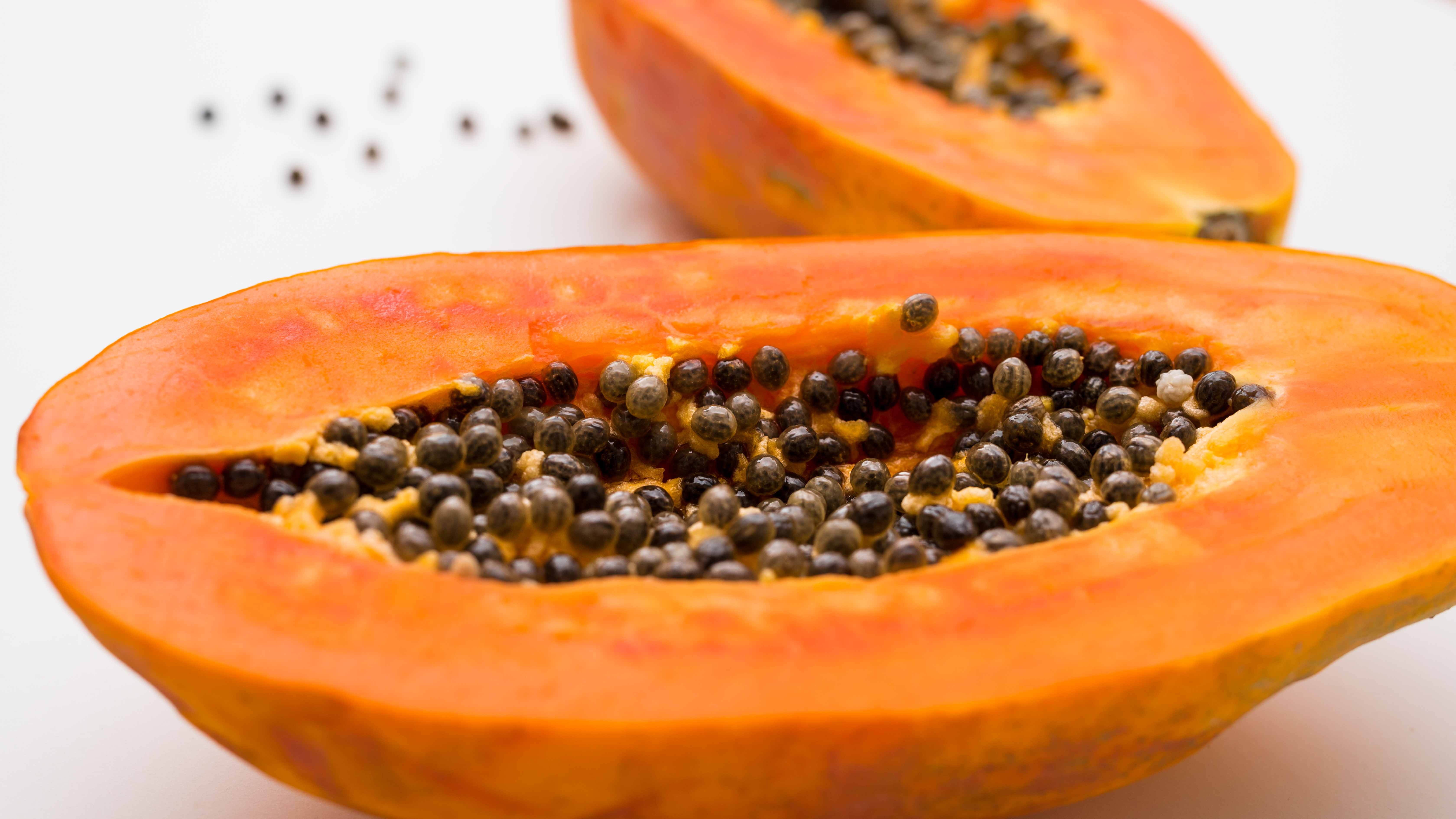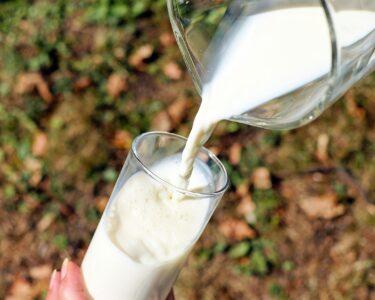Do you run after kiwi, avocado, berry –all the imported exotic fruits for health reasons? Stop burning your pocket. Your desi fruits are no less. Believe it or not, papaya is a powerhouse of nutrients, phytochemicals, and antioxidants. The Benefits of papaya will surprise you. Raw papaya is consumed as a vegetable whereas ripe papaya is a tasty fruit, available throughout the year at a moderate cost. (1,2)

Benefits of Papaya
Nutritive value –
Let’s begin by checking the nutritive value of papaya
Table-1: Macro-nutrient Content of Green Papaya and Ripe Papaya (Values /100 of edible portion)
| Nutrient(s) | Green Papaya (the vegetable) | Ripe Papaya (the fruit) |
| Moisture (g) | 92 | 90.8 |
| Protein (g) | 0.7 | 0.6 |
| Fat (g) | 0.2 | 0.1 |
| Carbohydrate (g) | 5.7 | 7.2 |
| Fibre (g) | 0.9 | 0.8 |
| Energy (Kcal) | 27 | 32 |
| Total minerals (g) | 0.5 | 0.5 |
Both the forms of papaya, the green, unripe, raw papaya, and the yellow or orange-colored ripe papaya are low-calorie, low-protein, low-fat and low in carbohydrate.
Table-2: Mineral Content of Green Papaya and Ripe Papaya (Values/100 of edible portion)
| Mineral(s) | Green Papaya | Ripe Papaya |
| Calcium (mg) | 28 | 17 |
| Phosphorus (mg) | 40 | 13 |
| Iron (mg) | 0.9 | 0.5 |
| Sodium (mg) | 23 | 6 |
| Potassium (mg) | 216 | 69 |
| Magnesium (mg) | — | 11 |
| Copper (mg) | — | 0.2 |
| Sulfur (mg) | — | 13 |
| Chlorine (mg) | — | 11 |
Both green papaya and ripe papaya fruit, are good sources of minerals like calcium, phosphorus, and iron. Ripe and/or unripe papaya is a low-sodium vegetable/ fruit which is an excellent source of potassium.

Table-3: Vitamin Content of Green Papaya and Ripe Papaya (Values/100 of edible portion)
| Vitamin(s) | Green Papaya | Ripe Papaya |
| Carotene (mcg) | 0 | 666 |
| Vitamin-C | 12 | 57 |
| Thiamine (mg) | 0.01 | 0.04 |
| Riboflavin (mg) | 0.01 | 0.25 |
| Niacin (mg) | 0.10 | 0.20 |
Reference- Nutritive value of Indian foods, ICMR, 2016
Surprisingly, beta-carotene is not present in the green, unripe papaya but the ripe papaya fruit is an excellent source of it (666mcg of carotene/ 100g of ripe papaya). Likewise, green papaya is a poor source of vitamin C, containing only 12mg vitamin-C/100g of green papaya which increases by 5 folds during ripening of the fruit. Both the raw and ripe forms of papaya contain little amount of B-vitamins but the ripe fruits contain more amounts than the green vegetable form.
Bottom Line
Both raw, unripe papaya and ripe papaya fruit are low-calorie, low-fat, nutritious plant food rich in many vitamins and minerals. But in terms of nutritive values, ripe papaya fruit is better than the commonly consumed vegetable, green papaya.
Phytochemical and Antioxidant(s) Content in Papaya
Papaya contains many bioactive phytochemicals which exert many health benefits. It contains substantial amounts of carotenoids, flavonoids, and polyphenols. It is rich in beta-carotene which is converted into vitamin-A in the body. The red flesh of the ripe papaya is a good source of lycopene.
Papaya contains many antioxidants like vitamin C, tocopherols, total phenols, B-vitamins, etc. Papaya has a high hydroxyl radical and hydrogen peroxide scavenging activity. Due to the high antioxidant contents of papaya, it can prevent cholesterol oxidation and can be used as a preventive treatment against atherosclerosis, strokes, heart attacks, and diabetic heart disease.
So instead of buying papaya face wash, add papaya vegetables and/or fruit to your daily diet on a regular basis and increase your antioxidant content in the diet. (3,4)
Bottom Line
Papaya contains several phytochemicals and antioxidants which together with its nutrient content exert its medicinal property. You should include ripe papaya fruit in your daily diet to increase your antioxidant intake and thus reduce the risk of several diseases.
Read –Benefits of guava fruit- The underrated super food

Medicinal benefits of Papaya
1. Papaya improves your general health
Regular intake of papaya increases the antioxidant content of your diet which helps to improve your general health. It is especially good for elderly individuals. (5)
2. Papaya improves your immunity
This fruit can strengthen your immune system and therefore it is useful to prevent recurrent diseases like common colds and flu and gastrointestinal infections. (6,7)
3.Papaya helps to prevent allergy
It contains a digestive enzyme-papaintha which can effectively treat allergies. (8)
4. Papaya intake is good for your eyes
Papaya is a very good source of pro-vitamin-A (beta carotene) which helps to maintain the normal functioning of the retina and is essential for our night vision. Vitamin-A is also required for growth, development, and reproduction.
5.Papaya is good for your skin
Being a good bleaching agent, papaya forms a vital ingredient in liquid and bar bath soaps, hand washes, astringents, and even detergent bars.

6. Papaya is good for your digestive system
Indigestion, bloating, constipation, etc. are very common problems of middle-aged and elderly individuals. Regular intake of papaya can give you relief from these problems.
Consumption of ripe papaya fruit after a meal can improve your digestion. The biologically active constituents of papaya, chymopapain, and papain, are used in the treatment of digestive disorders.
Regular intake of ripe papaya helps to prevent bloating and chronic indigestion.
Papaya intake prevents nausea, vomiting, and morning sickness in pregnant women.
It increases the iron absorption from the diet.
Since papaya is an excellent source of dietary fiber, regular intake of papaya helps to prevent constipation.
7. Papaya Helps to prevent many Stomach Ailments
Intestinal worm infestation and bacterial infection is a common problem for children and adults. It is a significant global health problem with enormous financial implications, particularly in developing countries. Regular intake of papaya helps to prevent many digestive disorders because- (9)
Several anthelmintic compounds (like carpaine, benzyl isothiocyanate, and papain) are present in papaya fruit, seeds, latex, and leaves which can remove the parasitic worms from the body.
Papaya also helps to prevent amoebic diseases due to their anti-amoebic properties.
After antibiotic treatment, intake of whole papaya fruit or drinking papaya juice help to replenish the intestinal microflora.
Both the ripe and unripe papaya fruits have significant antibacterial activity against several common disease-producing bacteria.
Chitinase is a type of enzyme, present in papaya which has antifungal and antibacterial activities.
The bacteriostatic activity of papaya may also be attributed to its free radical scavenging potential.
Papaya latex was effective in inhibiting the growth of Candida albicans due to its antifungal property.

8. Papaya is a good choice of food for Cardiac patients
Papaya is a heart-friendly food. Regular intake of papaya helps to improve cardiovascular health. It is especially good for elderly individuals who are at greater risk of cardiac diseases because-
Ripe papaya fruits intake is good for those having high blood pressure. (10)
Papaya is a good source of carpaine which has beneficial effects on the myocardium. Regular intake of papaya helps to decrease systolic, diastolic, and mean arterial blood pressure. (11)
Since papaya is a low-sodium fruit containing high levels of potassium it can be helpful for hypertensive people to balance their overall daily dietary intake of sodium. (11)
Those persons suffering from Diabetes for a long time, have a greater risk of getting cardiac disease also. It is reported that papaya helps to prevent heart disease among diabetic patients. So, ripe papaya intake is especially essential for the elderly who are suffering from both diabetes and cardiac problems.
It protects you from heart attacks and strokes.
Papaya intake is good for those suffering from high blood cholesterol levels because the fiber content of papaya helps to reduce blood cholesterol levels. (12, 11)
The biologically active constituents of papaya, chymopapain, and papain, are used in the treatment of arthritis and digestive disorders.
9. Papaya is useful to reduce inflammation in many chronic diseases
Papaya lowers the inflammation in the body. Several antioxidant nutrients found in papaya, including vitamin C, vitamin E, and beta-carotene, help to reduce inflammation. Papaya can be effectively used to reduce the severity of many chronic diseases. (11)
Papaya is effective to reduce the severity of many painful bone-related diseases of the elderly. It is useful for those suffering from osteoarthritis or rheumatoid arthritis or polyarthritis.
Papaya helps to relieve pains.
It reduces inflammation, edema, and pain caused by sports injuries.
10. Papaya helps in wound healing
Papaya is traditionally used to treat many types of skin sores and ulcers. Papaya helps in wound healing in the following ways-
Fibrin is an important blood-clotting factor that is mainly formed in the body of animals. It is usually not present in plant foods, but papaya is an exception which is a rich source of fibrin. Due to the presence of fibrin, papaya is very useful in the quick healing of wounds. Papaya paste/ointment, made from fermented papaya flesh, is used traditionally for the relief of burns, cuts, rashes, and stings.
Papain and chymopapain, proteolytic enzymes present in papaya, are helpful for the wound healing process when applied topically.
The antimicrobial activity of papaya also helps to treat chronic skin sores and ulcers.
11. Papaya is good for your Liver Health
Papaya protects your liver from the virus and toxins. It also reduces the risk of liver cancer due to its antiproliferative and anticancer properties. (11)
12. Papaya helps to Prevent Colon Cancer
Papaya fruit is an excellent source of several antioxidants which help to remove free radicals and prevents certain forms of cancer, including colon cancer. Fiber present in papayas can bind to cancer-causing toxins in the colon and keep them away from the healthy colon cells whereas antioxidants present in papaya protects the colon cells from free radical damage. (11)

Bottom Line
Starting from improving your general health, papaya helps to boost immunity, prevent allergy, good for your eyes, skin, and for your liver, digestive system. Papaya Helps to prevent many stomach ailments and is also a good choice for cardiac patients. Papaya is useful to reduce inflammation in many chronic diseases, helps in wound healing, and may prevent colon cancer.
Read – 4 steps for constipation treatment at home
Enough of diabetic diet – lets focus on reversing diabetes
Feed your mind right -A dietary guideline for depression
Caution
Though the papaya is a nutritious vegetable and/or fruit, it has certain adverse effects like-
Papaya contains certain anti-nutrient compounds such as phytate, oxalate, and tannins. The levels of these anti-nutrients present in papaya (Carica papaya) decreases gradually with an increase in storage period and temperature (14)
The latex present in papaya may irritate and may provoke some allergic reactions in hypersensitive individuals.
So, it is advised to take both the forms of papayas, as a vegetable and as a fruit, in moderate amounts but on a regular basis to achieve maximum health benefits. Hypersensitive or allergic persons should avoid the vegetable and/ or fruit.
Also, Read – Top 10 healthy snacks ideas
Top 9 Healthy summer drink ideas

Summary
Raw papaya is a commonly available vegetable whereas ripe papaya is a tasteful fruit, available throughout the year at a moderate cost.
Papaya is a low-calorie, low-fat vegetable and/or fruit, rich in many vitamins, minerals, phytochemicals, and antioxidants.
Regular intake of papaya has several advantages. Papaya can help in the digestion of food proteins and prevent many stomach ailments. It helps to prevent many common recurrent illnesses like colds and flu, stomach ailments, etc.
The nutrients and phytochemicals contained in papaya can reduce inflammation, support the functioning of cardiovascular, immune, and digestive systems, and may also help in the prevention of colon cancers. Papaya pastes can be used externally as a treatment for skin wounds and burns.
Get the benefits of papaya by including it in a regular diet. Just don’t forget that eating in moderation is the key.






4 Comments